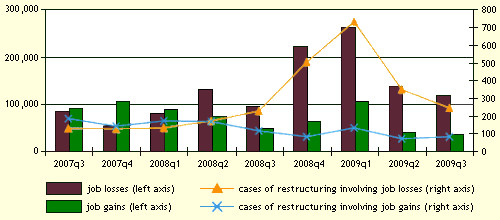Comparing national approaches to managing restructuring
1 Feb 2010
Andrea Broughton, Principal Research Fellow
 The current difficult economic climate has made an impact all around the EU – as we are seeing in this issue of employment studies – causing businesses to close and resulting in workers losing their jobs. The way in which governments, public agencies, social partners and other involved parties are managing this differs throughout the EU.
The current difficult economic climate has made an impact all around the EU – as we are seeing in this issue of employment studies – causing businesses to close and resulting in workers losing their jobs. The way in which governments, public agencies, social partners and other involved parties are managing this differs throughout the EU.
According to the latest figures published by the European Monitoring Centre on Change (EMCC)[1], there were 326 cases of restructuring in the EU during the third quarter of 2009, resulting in 119,000 job losses and 36,000 jobs created. This compares with 304 cases of restructuring recorded in the third quarter of 2008, resulting in 85,904 job losses and 48,804 jobs created. Although the EMCC is recording high levels of restructuring and job losses, it may the case that the level of job losses peaked in the first quarter of 2009, which recorded the loss of 220,000 jobs.
Recognising that a significant level of restructuring is taking place at the moment, and wanting to find out more about the debates being held and the initiatives being set up in individual EU member states, the European Commission has commissioned a series of 27 seminars, held in each of the 27 EU member states, looking specifically at national approaches to anticipating and managing restructuring. The aim of the seminars is to support knowledge-sharing on restructuring and to disseminate the lessons learned on measures aimed at anticipating and managing restructuring at the national, regional, and local levels, and across specific economic sectors.
Number of cases of restructuring and total number of announced job losses and gains in the EU

Source: ERM, Autumn 2009
The seminars that have been held so far have found that most EU member states have introduced employment and social measures in order to support people and alleviate the human cost of the crisis. Overall, measures tend to be focused on four broad types of priorities:
- measures aiming at maintaining existing jobs
- measures to ensure rapid integration and reintegration into the labour market
- measures to support the most vulnerable people
- measures to strengthen social protection and invest in the social and health infrastructure.
Each seminar has included a number of case study presentations, looking at individual cases of restructuring and how this has been handled. These have been of particular interest in determining what works in a restructuring situation, and what the potential barriers can be. Discussions have been held around issues such as the importance of early communication within an organisation, the building of trust with the workforce, and the need to work openly and closely with employee representatives in order to devise a package of measures that are as closely tailored as possible to the needs and specific culture of individual organisations.
The state can play an important role in supporting and helping organisations to anticipate and manage restructuring by providing outplacement services, dedicating resources to reskilling, upskilling, and generally increasing the employability of workers who are threatened with, or actually facing, redundancy.
One key theme of the debates held during the seminars centred around the fact that although the incidence of restructuring and job losses has increased over the past year, due to the current financial crisis, enterprise restructuring is something that tends more and more to be a part of everyday life – organisations need to change and adapt on a continuous basis if they want to remain competitive. Therefore, it is vital that well thought-out policies and initiatives are in place to mitigate the employment impact of restructuring as much as possible.
The ARENAS project
The project is entitled Anticipating Restructuring in Enterprises: National Seminars (ARENAS) and has a dedicated website, which contains documentation from each seminar as well as background material and European documentation.
The seminars are being run by the International Labour Organisation (ILO), and began with a seminar in Italy in April 2009. Prior to each seminar, a background paper is prepared by a national expert on the main measures and tools in place to anticipate and manage restructuring in that country. This background paper is then discussed at the seminar, along with presentations from a range of experts and company case studies on how restructuring was anticipated and managed.
The UK seminar was held in London in September 2009 and attended by a range of representatives of the UK government, agencies such as Jobcentre Plus, trade union and employer representatives. It was also attended by representatives from individual companies, who presented case studies of how restructuring was managed in specific cases. IES helped to organise the Irish national seminar, which took place in Dublin on 17-18 December 2009.
Andrea Broughton, IES Principal Research Fellow, sits on the technical committee for this project.
Further seminars are planned during 2010 and at the end of the project, in September 2010, a synthesis report will draw together the lessons learned about anticipating and managing restructuring in Europe.
Footnote [back]
[1] European Foundation for the Improvement of Living and Working Conditions (2009), European Restructuring Monitor Quarterly, Issue 3.
For more information on this work, please contact Andrea Broughton at IES.

